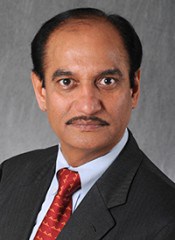 A DC court has denied part of George Washington University’s motion to dismiss a $8 million lawsuit by a biologist who claims his employer mishandled an investigation into his work.
A DC court has denied part of George Washington University’s motion to dismiss a $8 million lawsuit by a biologist who claims his employer mishandled an investigation into his work.
Last spring, GW filed a motion to dismiss the case, brought forward by Rakesh Kumar, who has three retractions. A judge has allowed the case to proceed, honoring parts of the school’s motion to dismiss, but denying most of it.
The memorandum opinion gives the specifics:
Plaintiff Dr. Rakesh Kumar, a professor of biochemistry and molecular medicine, brings suit against his employer George Washington University (“GW” or “the university”), alleging that the university improperly handled its investigation into his suspected research misconduct. The university’s motion to dismiss on the ground of official immunity succeeds in disposing of Kumar’s claim for tortious interference with business relations, but there is no immunity as to his other four claims. And his tortious invasion of privacy claims must be dismissed for failure to state a claim. But the university’s motion to dismiss will be denied in part because Kumar has pled sufficient facts to state a claim for breach of contract and breach of the implied covenant of good faith and fair dealing.
Essentially, the university argued it should have the immunity typically afforded to the government — ie, it can’t be sued in the way that Kumar is suing it — because it was acting on behalf of the government by investigating how Kumar used federal grant money. A judge has now ruled that GW was largely unsuccessful in making that argument, thus losing its attempt to quash much of Kumar’s claims.
Kumar’s lawyer, Peter Paul Thaler, told us:
We thought it was a well-reasoned opinion. We disagree with some of the findings by the judge, [but] overall we were satisfied.
Thaler explained that in his view:
What GW did in its investigation and report were sub-standard.
The university now has a chance to respond, Thaler explained to us, and then the case will head to the discovery process, wherein both sides can collect evidence.
Thaler added that he thinks Kumar has
been given a bad hand with this particular investigation. I’ve seen over a 100 misconduct cases, and this was a poorly handled investigation.
We make an appearance in this suit, too — the memorandum states that:
Kumar has adequately alleged breaches of these contractual provisions. Start with the confidentiality provision. Kumar alleges that only he and the university were privy to certain information about the investigation. While the investigation was underway, “an anonymous source privy to confidential information about the [university’s] inquiry released the confidential information to [an] online blog.”
The original lawsuit specified that Retraction Watch is the blog in question.
We contacted GW but haven’t heard back; a spokesperson has previously told us that they are unable to comment on ongoing litigation.
Like Retraction Watch? Consider making a tax-deductible contribution to support our growth. You can also follow us on Twitter, like us on Facebook, add us to your RSS reader, sign up on our homepage for an email every time there’s a new post, or subscribe to our new daily digest. Click here to review our Comments Policy. For a sneak peek at what we’re working on, click here.
If you’re going to report that the allegation in that blockquote was made regarding the involvement of this site, you really should make some sort of comment or about whether it’s accurate, or else you should explicitly state that you feel it’s inappropriate to comment on the question of your involvement outside of the court process. Just letting it hang there when you so obviously have the ability to reply, without actually saying it would be wrong to reply, seems off.
Thanks, we’ve commented on that in an earlier post: http://retractionwatch.com/2015/02/11/rw-cited-scientists-8-million-suit-university/